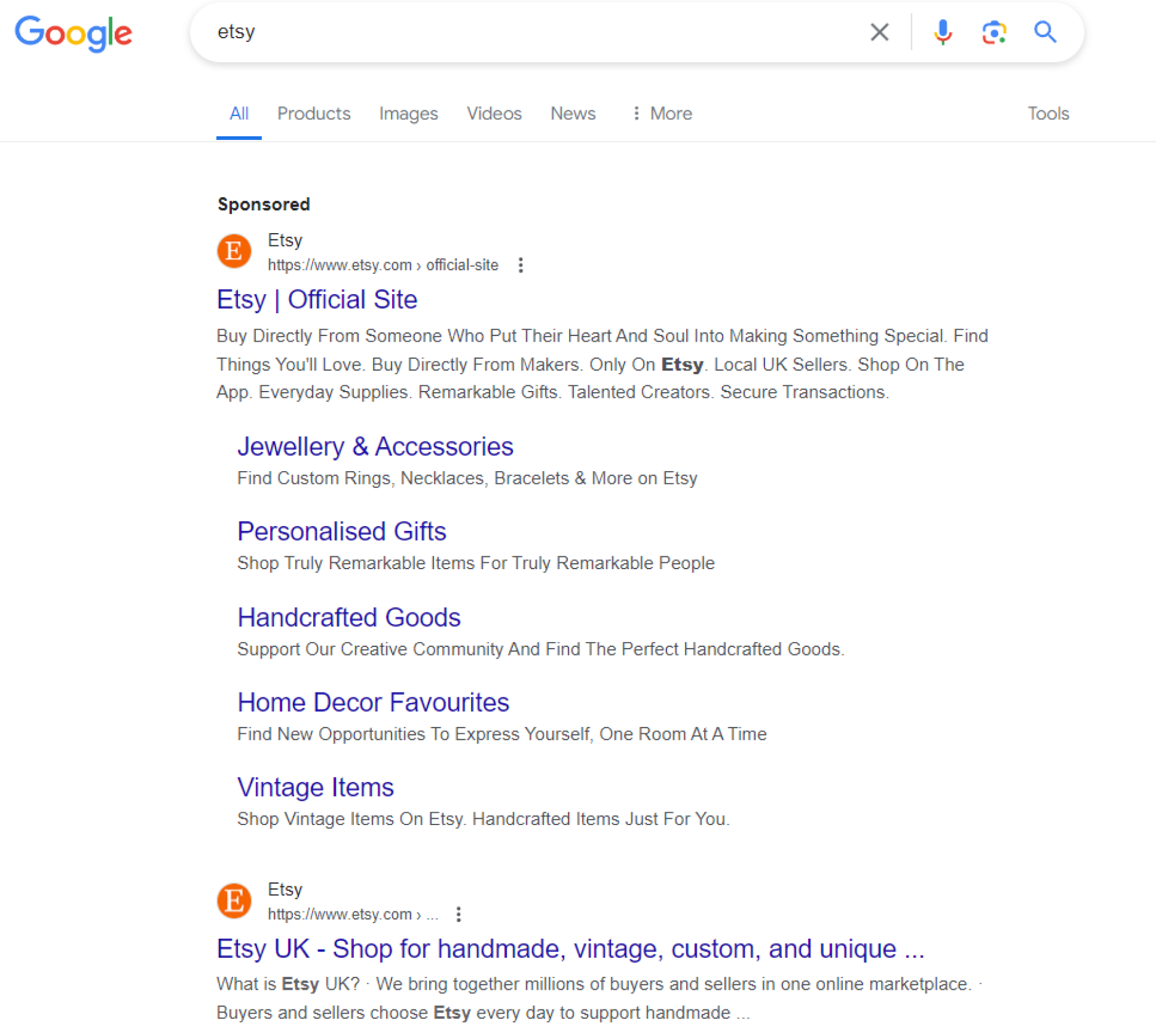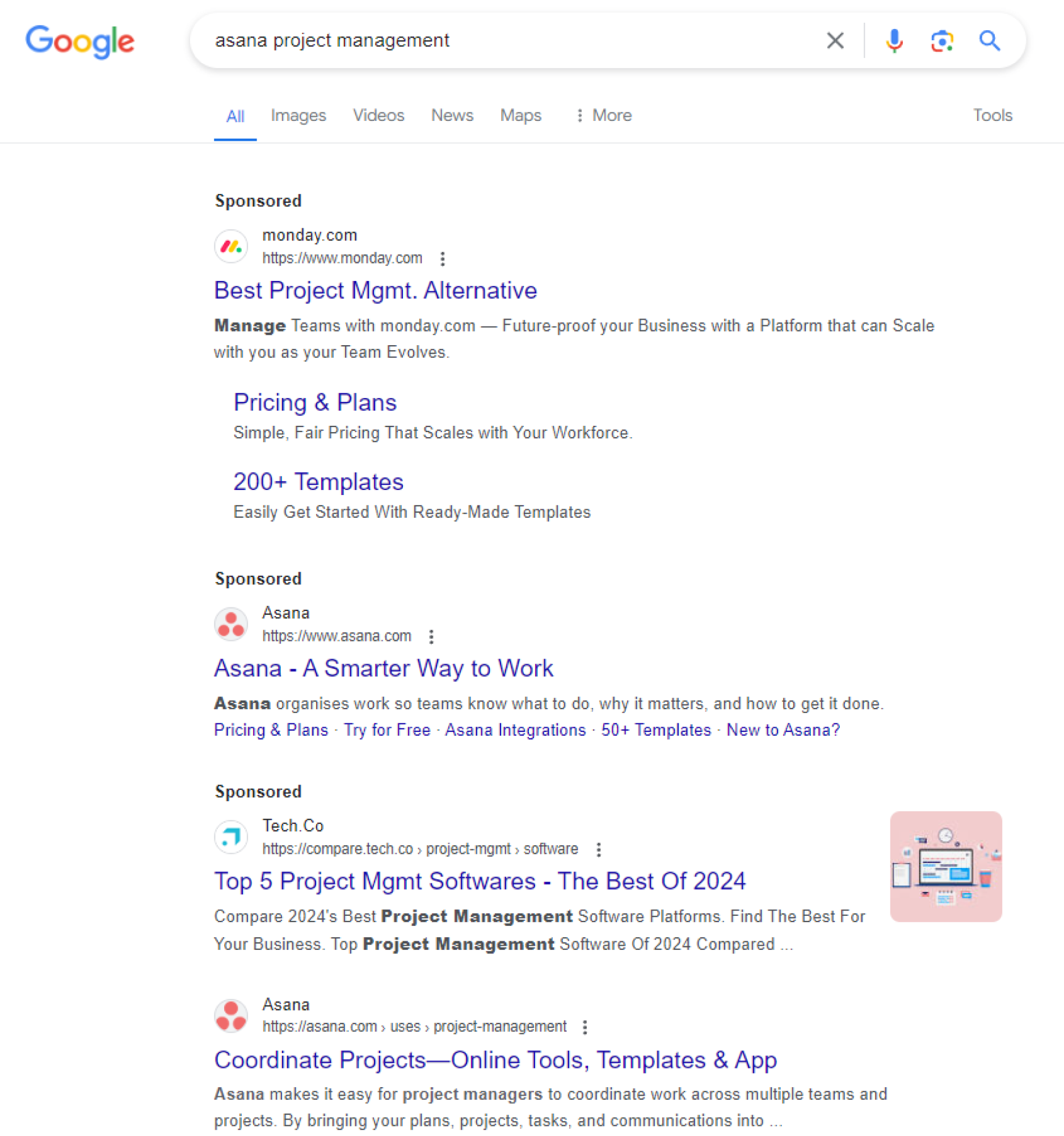Top 5 Insights from SERP Monitoring
10.05.2024
Contents
Hello there! This is the BluePear team, developers of advertising technology solutions to help protect your brand presence across brand SERP results.
Let's start with a simple task. Search for your brand's name on a search engine. What did you expect to see? Most likely, you thought the search results would mostly show your company's official website, social media pages, and other content you control.
This is what a brand's search results should look like. When people search for your brand, you want them to easily find your official website without any confusing or misleading listings.

Competitive Keyword Bidding
The most obvious issue – your competitors bid on your brand terms. While legally allowed in most regions, it's an aggressive tactic that can divert traffic and sales away from your own branded campaigns or organic listings.
As a real-world example, look at these search results for Asana – a tool for managing tasks, responsibilities, progress, and communication in real-time. The top paid ad positions are taken by direct competitors, potentially diverting customers before they even see the official company website.

Trademark Abuse
Another common issue is the unchecked, unauthorized use of your brand name and assets within paid ad copy and creatives in search results. This misleading practice can come from multiple sources – overly aggressive partners, dishonest competitors, or even scammers.
Regardless of who is doing it, it poses a serious risk to your reputation by misleading and redirecting customers away from your brand's official websites and pages. As this brand SERP results for "revenuelab" keyword demonstrate, unsuspecting users can easily end up on illegal third-party sites, instead of the official Revenuelab website.

Brand Bidding
When it comes to affiliate or partnership marketing programs, brands typically prohibit their partners from running any paid search ads on branded terms. After all, you don't want partners effectively bidding against you for your own hard-earned audience and online brand reputation.
However, some dishonest affiliates break these brand SERP rules, using a range of blackhat tactics like geo-targeting, ad scheduling, and cloaked redirects to avoid getting caught. As we explained before, this means brands end up paying for traffic and customers they would have gotten anyway.
Read about Ad Cloaking
Domain Spoofing
Taking the affiliate issue one step further, there are also cases of dishonest partners creating unauthorized clone sites that look exactly like the real brand's official website and are difficult to detect by SERP monitoring. For example, they may have the same domain but with an extra letter or typo.

Basically, they take advantage of the brand SERP reputation and authority for their own gain, while providing a bad and potentially harmful user experience. This is a serious problem that brands need to watch out for and deal with firmly by thorough SERP monitoring.
Coupon Sites The last issue has to do with coupon, deal, and cashback sites. These sites can help promote a brand's offers to new customers, which is good. However, they can also cause problems for the brand.
When promotions appear on coupon sites without the brand's approval, it makes it harder for the brand to control its pricing, deals, and special offers, let alone SERP monitoring. This can hurt the online brand reputation, reduce profits, or lead to customer service issues. Basically, the brand loses control over important marketing tools, resulting in an inconsistent brand experience for customers. For this reason, brands should carefully monitor search results and remove any unauthorized listings on coupon sites.
The keyword query "amazon promo codes" will take the user to a promo code aggregator, and when they click "Copy & Apply" they will be taken to a site with an affiliate link.
Final Thoughts As you can see from these real-world examples, achieving a pure, focused brand SERP monitoring is no easy task. Brands have to stay alert to protect their online reputation from threats both inside and outside the company.
Manually checking search results is not enough – you need automated, comprehensive SERP monitoring powered by advanced technology. That's where BluePear's solutions can help by giving you full control over how your brand appears in search.
Protect your brand presence and get more from your marketing budget with SERP monitoring. Take a free 2-week audit with Bluepear to check for violations that could harm your brand or steal potential customers. Connect with us today to learn how we can safeguard your brand's identity, marketing investments, and maximize your marketing ROI.

